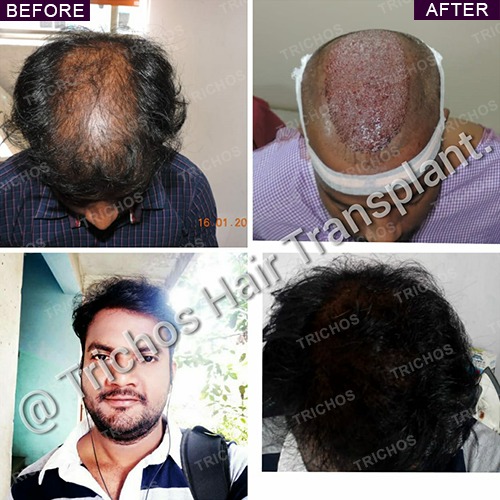Is Medical Treatment OK for Hair Thinning or Will it Lead to Baldness?
This is a common perception among hair transplant patients as well as the general population concerning hair thinning: That hair thinning may lead to baldness, making it inevitable for one to undergo a hair transplant.
Is this a true statement? Or is medical treatment sufficient to treat hair thinning problems? In this educational video, Dr John Watts – a noted dermatologist, trichologist and hair transplant surgeon in Hyderabad – explores this important topic and demystifies it.
He has successfully performed over 1900+ hair transplant procedures.
Baldness Vs Hair Thinning:
There is no need to panic in case of hair thinning, says Dr John Watts. “Yes, this is a hair loss condition but it may not lead to baldness.”
Instead of panicking, Dr John tells the viewers to try to find the cause that is leading to hair thinning. Some of the reasons for hair thinning could be high-stress levels, poor diet and nutritional deficiency. Even Telogen Effluvium can cause hair thinning.
“The best recourse is to take a close look at your life and introspect where you are going wrong and then consult your dermatologist to find out the cause and immediately start medical treatment for its control,” advised Dr John Watts.
In the early signs of hair thinning, however, one does not immediately need to undergo a hair transplant.
Advised Tests for Diagnosis
Some of the tests that your dermatologist might recommend may include running tests to check HB levels, Vitamin B and Vitamin D levels or thyroid hormone levels in your body.
“Hair thinning is usually a treatable condition. Once the right diagnosis is made, one may recover the lost hair due to hair thinning in 6-8 months,” informed Dr John Watts.
But, even when it is a normal hair thinning case, a receding hairline cannot be restored with plain medical treatment.
However, in case the test reports come normal and hair thinning/ hair loss continues, as usual, then it is time to suspect heredity hair loss. One can also suspect heredity hair loss as the cause if hair thinning resumes after one stops medical treatment.
“If hair thinning is due to heredity issue, it may manifest into baldness. One can suspect signs of baldness when one notices a receding hairline at the sides or baldness at the crown. In such a condition, one needs to consult his/her dermatologist for an opinion,” said Dr John.
It must be remembered that without a hair transplant, a receding hairline or baldness at the crown area cannot be restored.
Conclusion:
In his concluding note, Dr John sums up the issue by reminding the viewers that hair thinning does not mean baldness. “In 70% of hair thinning cases, medical treatment is sufficient. But if medical treatment does not work, the only option left is hair transplant,” he said.
Book an appointment for expert guidance


About
Causes
Alopecia
Restoration
Procedures
Locations
Disclaimer: While hair transplants are generally safe and effective, as with any medical procedure, there can be minimal and temporary side effects based on specific or underlying medical condition of the individual patient. Please consult in person with our qualified medical team at Trichos for a thorough assessment of your specific condition and individualized guidance on the potential risks and benefits associated with our hair restoration treatments.
Learn more about Medical Consent for Surgeries.



